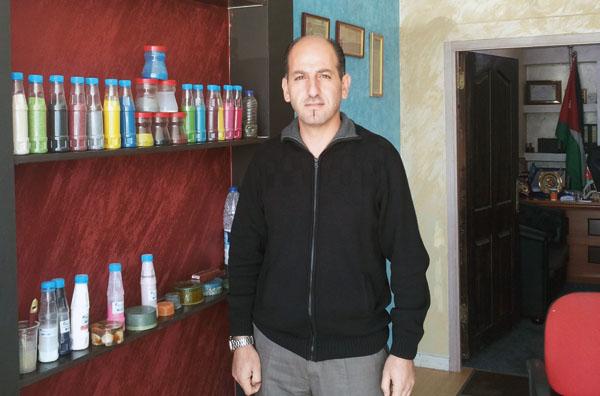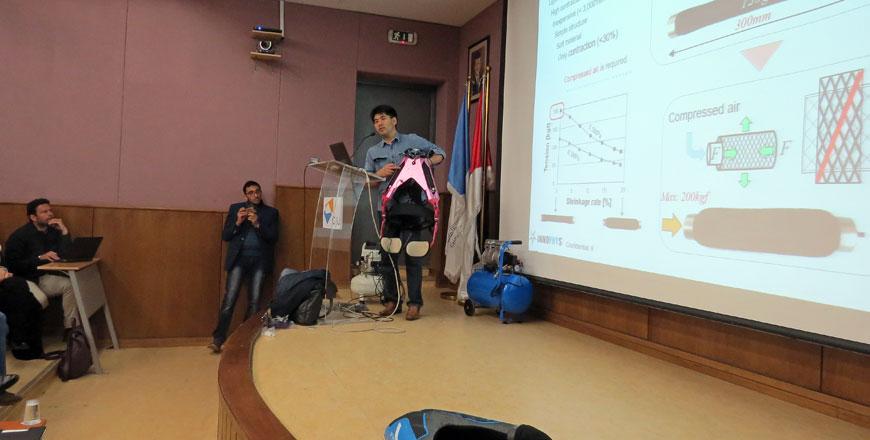You are here
The man who wants to save the world’s seas, from Jordan
By Johannes Decat - Mar 23,2015 - Last updated at Mar 23,2015

AMMAN — Already in his childhood, Yasser Khattab was a troubleshooter with an urge to help other people, his country and “humanity”.
The established inventor started with attempts to prevent the damp spots on the walls in his house, a problem, he noticed, bugging many households in the country.
This inclination to use his talent and experience to help others has evolved to target stubborn international problems.
He has 56 patents and hundreds of ideas in the pipeline, he says, but his signature invention would rid the world and marine life from the dangers of oil leaks.
Now, at the age of 45, Khattab is a well-established inventor. His office is located close to the Ottoman ‘Ten Bridges”, area spanning the valley of the Yarmouk neighborhood in east Amman.
Apart from being an inventor, Yasser Khattab can call himself an interior designer, architect and sculptor. “All that drives me is the desire to create something new and unique.”
The walls of his office are covered with framed awards and certificates of recognition, among which from the “global initiative for humanitarian leadership”, and intellectual property certificates. Above a brown couch hangs a patent related to “a substance for blocking fuel leaked in the water”, which Khattab obtained in Lebanon, due to “bureaucratic complications in Jordan’s patent registration process”.
“I want this invention to be developed by Jordanian industries,” Khattab firmly says, hoping this will secure the Kingdom with the one unique and lucrative product that could make a difference to its economy and future.
The patented invention concerns a powder mix facilitating the cleaning up of oil leaks at sea.
When the conventional method is applied, the polluted area is surrounded with barriers and the oil is then sucked from the water’s surface. According to Khattab, this method has cost the company British Petroleum 25 billion dollar so far in the clean-up of the 2010 Deepwater Horizon oil spill in the Mexican Gulf.
“My invention is cheaper and more environmentally friendly,” Khattab says. Through the use of nanotechnology, he came up with a water-based material that can be scattered over the oil slack. It transforms the oil into solid, floating lumps, which can be removed very easily from the surface. According to the Khattab, his invention would reduce the cost of the cleanup to 10 to 15 per cent of the conventional method’s costs. “(And) it does not negatively affect the environment,” he adds. On top, “I invented another substance that can be used to turn the solid masses into oil liquid again and hence it can be reused.”
At the entrance of his office, Khattab, who has six honorary doctorates from various universities, has installed a glass container of about one cubic metre, filled with soil and a water puddle in the middle. “It’s been here for more than a year,” Khattab smiles. This model represents another resourceful invention of his and one that is very good for Jordan’s water harvest, he says.
The sand soil is covered with one of his products “Smart Penetration”, making the sand surface 100 per cent waterproof, he claims. The product is not patented but he currently has four successful pilot projects on farms in Jordan Valley.
He has dug holes into the soil and covered these with an impermeable layer. This prevents rainwater from seeping into the sandy earth and provides farmers with a cheap water reservoir which they can use for irrigation or to water their livestock. “My product is tested and is absolutely harmless to the environment,” he says. Moreover, he claims he has invented a substance that prevents evaporation, pointing to his small experiment and insisting that the water had been there for an entire year without shrinking.
With twinkling eyes, Khattab comes running with wood, bricks, a carton and paper to show his waterproofing invention in practice. Thick drops of water remain lying on a paper towel Khattab previously sprayed with his liquid chemical solution.
Khattaab has further developed insulation solutions for, amongst others, tiles and concrete. Other inventions include a substance fortifying cement and a method to recycle waste material from stone factories to produce design tiles and other products, which he showed to The Jordan Times.
“Unfortunately, I don’t have the funds to further develop many of my projects yet,” he says. A lack of funding seems to be a recurrent problem for him.
At least one foreign company has extended offers to him, he claims, but he refused because “they wanted to buy me, not my inventions.”
The inventor, a goodwill ambassador and envoy of at least two international organisations, hopes to be offered a fixed contract by which he will be able to develop his work himself in his country.
Related Articles
AMMAN — Young inventors should strive to solve what they consider the “worst thing to happen”, while always being aware of how to further de
AMMAN — Patent applications filed by foreigners in the Kingdom substantially outnumbered patent applications filed by Jordanians in 2016, wi
AMMAN — His Majesty King Abdullah on Friday attended the 92nd Hashemite Scientific Council at the Royal Cultural Centre, the second to be he

















